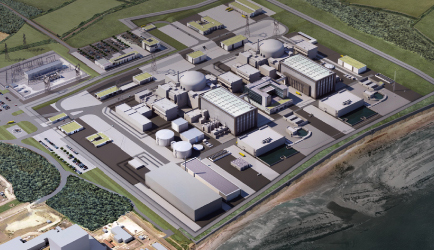The Hinkley Point C project in the U.K. is like a Mexican soap opera or a train wreck in slow motion. The French utility EDF was selected by the U.K. to construct two new power reactors at the Hinkley Point power plant on the coast of Britain. The reactors are to based on the new European Pressurized Reactor design. The Chinese nuclear company, China General Nuclear Power (CGNP) has agreed to pick up about a third of the cost if they are allowed to build a Chinese designed reactor with Chinese workers at another location in Britain.
The project has been in the works for over a decade. Politics, economics and technical issues have conspired to delay the project time and again. Just when EDF was finally ready to sign the contract, the Brexit happened and the new government of Theresa May decided to reconsider the deal and declined to sign the contract.
One big point of contention in the U.K. over the project is the fact that the intelligence agencies of the U.K. are worried about giving a potential enemy access to the nuclear infrastructure for the U.K.
Now comes the news that CGNP has been charged by the U.S. justice department with nuclear espionage. Assistant US attorney general John P Carlin said: “Allen Ho, at the direction of a Chinese state-owned nuclear power company (CGNP) allegedly approached and enlisted US-based nuclear experts to provide integral assistance in developing and producing special nuclear material in China.
“Ho did so without registering with the Department of Justice as an agent of a foreign nation or authorization from the US Department of Energy”, Carlin continued. “Prosecuting those who seek to evade US law by attaining sensitive nuclear technology for foreign nations is a top priority for the National Security Division.”
“The federal government has regulations in place to oversee civil nuclear cooperation”, said Michael Steinbach, executive assistant director of the FBI’s national security branch. “If those authorities are circumvented, this can result in significant damage to our national security. “The US will use all of its law enforcement tools to stop those who try to steal US nuclear technology and expertise.”
This sort of unscrupulous and illegal behavior is just the sort of thing that the intelligence agencies of the U.K. are worried about if the Hinkley Point C project goes forward.
China was counting on the approval of the Hinkley Point C project to allow them to build a demonstration model of a Chinese reactor which they could use to help them sell their nuclear technology abroad. The refusal of the May government to sign the contract has prompted a harsh reaction on the part of the Chinese government. The U.K. is the largest trading partner that China has in the European Union. Some of the Chinese comments seem to suggest that trade and the special relationship between the U.K. and China may suffer if the U.K. does not sign the contract and go ahead with the Hinkley Point C project.
A new analysis indicates that the cost of wind and solar power will be substantially lower by 2025 than the cost of electricity generated by the Hinkley Point C reactor when they are supposed to be completed in 2025. The big question is how many more negative factors will have to pile up before the U.K. cuts its losses and permanently cancels the Hinkley Point C project.
Artist's concept of Hinkley Point C:
